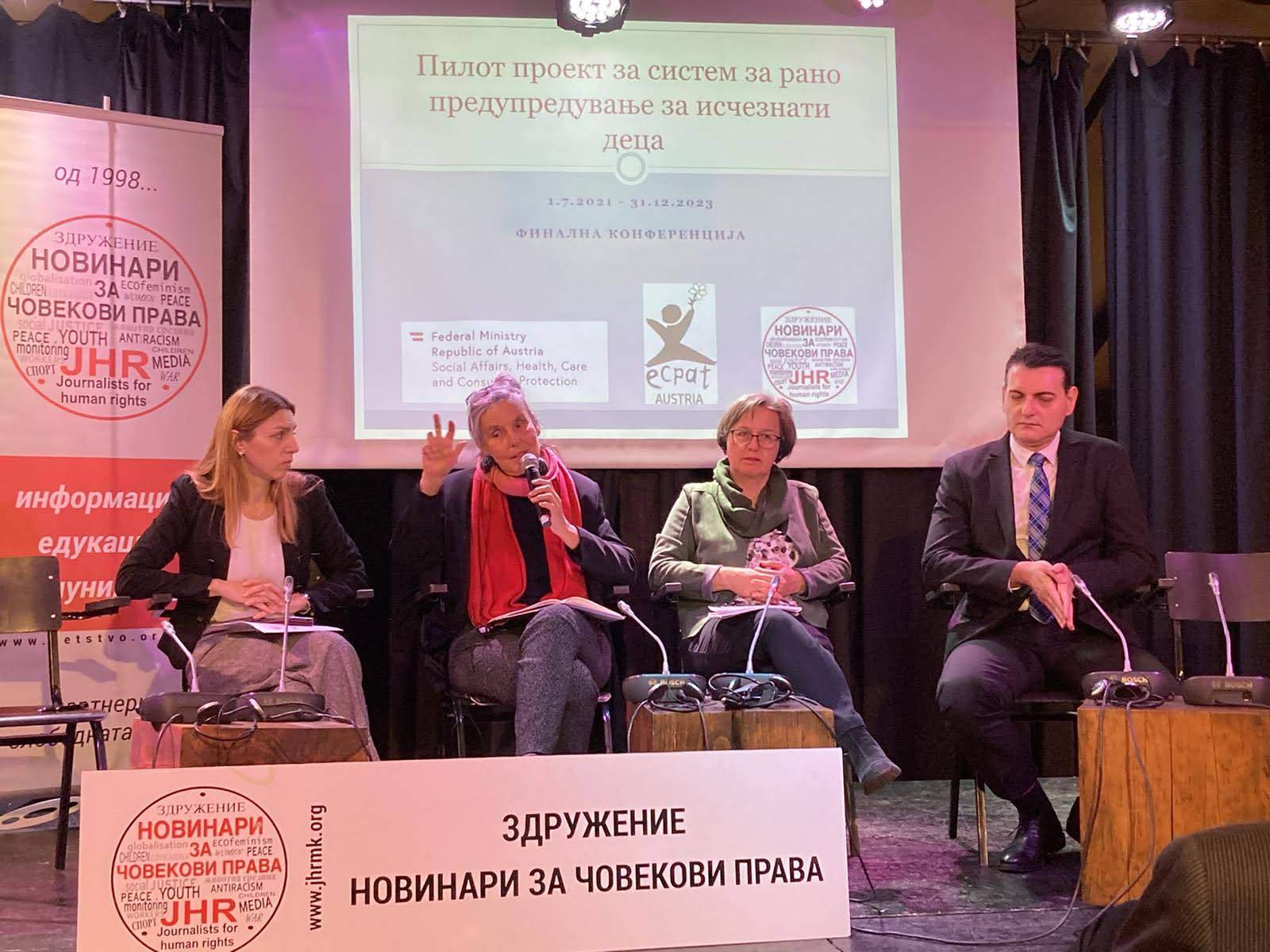Со обраќања и воведни зборови од Доц. д-р Јетон Шаќири, министер за образование и наука, Тони Ангеловски, помошник на министерот за внатрешни работи за односи со јавноста и Маг. Харалд Фугер, аташе, Федерално Министерство за социјални работи, здравство, грижа и заштита на потрошувачите на Република Австрија.
Министерот за образование Јетон Шаќири на отворањето на конференцијата истакна дека исчезнувањето на лице без трага секогаш предизвикува голема загриженост и страв кај членовите на семејството, пријателите и познаниците, чувства кои заедно со она што е најизразено во моментот – беспомошност, може да доведе до избрзани и непромислени постапки.
Емоциите се најсилни кога детето ќе исчезне и затоа, нема дилема дали државата треба да има систем за рано предупредување за исчезнатите деца“, рече Шаќири, оценувајќи дека е добро што е направен првиот чекор.
Тој изрази надеж дека оваа првична верзија на системот што ќе биде претставена денеска ќе биде ефективна, посочувајќи дека сите треба да се заложиме за континуирано надградување во иднина, особено со примена на позитивни искуства од развиените земји.
Северна Македонија, потсети тој, е земја која ја има ратификувано Конвенцијата на ОН за правата на детето и, како што рече, позицијата по ова прашање може да се зајакне, меѓу другото, токму со воспоставување и примена на таква алатка.
Шаќири нагласува дека образовниот систем има важна улога во раното предупредување на исчезнатите деца и дека Министерството за образование и наука го става на располагање сиот свој капацитет во развојот на овој систем.
„Сите поминуваат низ образовниот систем, а тој игра клучна улога во раното откривање на исчезнатите деца. Наставниците и училишниот персонал често се првите што забележуваат кога детето е отсутно или откриваат кога е изложено на некаков ризик, што се манифестира преку неговото однесување, изглед и слично.Од друга страна, токму во училиштата и преку наставни и воннаставни активности децата се запознаваат со потенцијалните опасности што ги чекаат. Така и понатаму ќе биде.„Образовни содржини поврзана со оваа тема веројатно ќе станува се почеста“, рече Шаќири.
Тој нагласи дека во завршна фаза е изработката на нов електронски дневник за учениците и дека се прават напори тој да се интегрира и да се поврзе за родителите секојдневно да знаат за изостаноците на нивните деца од наставата.
„Во завршна фаза е креирањето на новиот електронски дневник, кој треба да профункционира по пилотирањето што го имавме претходните месеци во Министерството за образование, поддржано од Европската Унија. „Со воведувањето на новиот електронски дневник. се прават сите напори да се интегрира и да се поврзе за да се добијат информации веднаш по внесувањето на податоците, односно родителите да можат секојдневно да добиваат ажурирани податоци за отсутните ученици“, рече тој.
Тој додаде дека Министерството за образование и култура ќе продолжи да се залага за подобрување на безбедноста на учениците, не само во училишните објекти, туку и надвор од нив, заедно со другите надлежни институции како МВР, но и локалните самоуправи, самите училишта и партнерските организации.
Помошникот за односи со јавноста на министерот за внатрешни работи Тони Ангеловски на конференцијата истакна дека безбедноста во државата не е работа само на полицијата и истакна дека сите заедно мора да придонесеме да имаме побезбедна држава.
„Ова е класичен пример за соработка со граѓански организации што ќе придонесе за поголема безбедност. Секако дека континуирано работиме на воведување на овој систем и мора да се преземат сите чекори пред тој целосно да се имплементира. Она што денеска се презентира е што е досега направено и продолжуваме интензивно да работиме за да го финализираме“, рече тој.
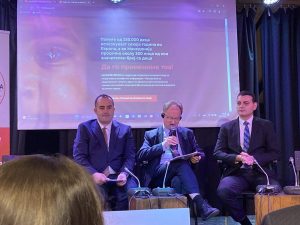
Маг. Харалд Фугер во своето обраќање на конференцијата ја истакна важноста на проектот „Пилотирање на систем за рано предупредување за исчезнати деца“ поддржан од австриското социјално Министерство за покривање на важни теми за подобра заштита на децата од трговија со луѓе, додавајќи дека за да може да се исполни меѓународните и европските обврски во полето на политиките за човекови права, важно е сите земји да воспостават ефективни механизми за координација и следење, како и професионални совети и услуги за поддршка, обезбедени особено од НВО.
-Во 2004 година, австриската федерална влада формираше работна група за борба против трговијата со луѓе со цел да ги координира и интензивира австриските мерки против трговијата со луѓе. Врз основа на ова, сите релевантни федерални министерства и владини агенции, сојузните држави, социјалните партнери и специјализираните невладини организации се претставени во оваа работна група. Главната задача на работната група е да подготви национални акциони планови за борба против трговија со луѓе и да се следи нивното спроведување. Националните акциски планови имаат сеопфатен пристап во борбата против трговијата со луѓе и вклучуваат мерки за национална координација, превенција, заштита на жртвите, рана интервенција, спроведување на законот и меѓународна соработка. Има обврска на секои три години, да поднесува извештаи за спроведувањето на националните акциски планови, Маг. рече Фугер.
Затоа, добрата држава на благосостојба и социјална заштита за да се избегне детската сиромаштија е важен превентивен пристап, нагласи тој, додавајќи дека на европско ниво е воведена обврската за сите земји-членки на ЕУ да воспостават шеми за детска гаранција, што е исто така релевантно. за Северна Македонија како земја членка во ЕУ.
-Сиромаштијата е главната причина за трговија со деца во многу земји, како и во Северна Македонија, затоа е важно земјата да воспостави и такви детски гаранции и слушнав дека е план да се воспостави во иднина во вашата земјата исто така, рече Маг. Харалд Фугер.
Што се однесува до овој проект, додаде тој, важно е да се воспостави ефикасен систем за рано предупредување. Во овој контекст, соработката со сите релевантни чинители, институции и организации е од витално значење, како и за зајакнување, зајакнување и финансиски обезбедување на децата од особено ранливите групи.
Заштитата на децата мора да биде врвен приоритет за сите земји кои ја ратификуваа Конвенцијата на ОН за правата на детето, додаде тој. Во овој контекст треба да бидат опфатени различни области како што се: Независно мониторинг тело за имплементација на правата на децата, Јасно разјаснување на обврските и задачите на сите чинители кои работат со деца и млади за заштита на децата, Разработка на стратегии и концепти за заштита на децата, Доволно финансирање на мерки и услуги против експлоатација и трговија со деца, мерки против насилство и советодавни услуги и поддршка на жртвите. Исто така, треба да се посвети внимание на подигањето на свеста, образованието и еднаквите можности, особено во однос на обесправените и ранливите групи, посочи тој.
Во овој контекст, во Австрија се развиени и конкретни насоки за дејствување за засегнатите професионални групи и институции за идентификување и справување со потенцијалните жртви на трговија со деца, кои исто така содржат основни информации и индикатори за идентификација на жртвите, Маг. додаде Фугер.
-Благодарам многу за овој ангажман на австриската невладина организација ECPAT како и на невладината организација Новинари за човекови права (JHR) во Северна Македонија кои тесно соработуваат во рамките на овој проект се многу ангажирани. Голема благодарност за оваа посветеност, а исто така и благодарност до сите релевантни институции во Северна Македонија кои тесно соработуваат во рамките на овој проект, Министерството за труд и социјална политика, МЗ, Министерството за внатрешни работи, Центрите за социјална работа, болниците итн. – рече Маг. Харалд Фугер со желба за успешно функционирање на системот.
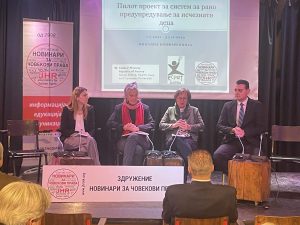
Валтрауд Гугербауер, директор на ECPAT Австрија, водечка организација во имплементацијата на проектот, членка на меѓународната мрежа ECPAT 122 организации во 110 земји), сподели некои детали за историјата на ECPAT Австрија и работата што ја прават – од теренската работа со деца за кампања, истражување, вмрежување, искуство и практики споделени со засегнатите страни во Северна Македонија за време на имплементацијата на проектот.
-Во Австрија започнавме со ECPAT во 2003 година, а јас сум одговорен за организацијата од неодамна, но и за програмите што вклучуваат сексуална експлоатација на деца во туристичкиот сектор, и мило ми е што ја имавме оваа можност да работиме на овој проект со JHR финансиран од Федералното министерство за социјални работи, здравје, грижа и заштита на потрошувачите. ECPAT Австрија се фокусира на кампањи, подигање на свеста, истражување и вмрежување кои се многу важни, рече Валтрауд Гугербауер, директор на ECPAT Австрија.
ECPAT Австрија е членка на австриската работна група за борба против трговија со луѓе и подгрупата за трговија со деца. Подгрупата на Работната група за трговија со деца работеше на предлог за Специјализиран интервентен центар за деца во соработка со СОС Детските села Австрија. Како што нагласи таа, има потреба од добар систем за превенција и пронаоѓање на малолетници кои исчезнуваат во земјите на ЕУ бидејќи тие често стануваат жртви на детска експлоатација и сексуална експлоатација, но како што напомена има институции кои вршат добра работа, вклучително и федерален истражен систем кој има добра врска со други европски и неевропски институции, а нивното искуство за обука е многу вредно.
Валтрауд Гугербауер ги спомена проектните активности во Северна Македонија, велејќи дека смета дека овој проект имал успешен процес на воспоставување на EWS и вмрежување на различни чинители од Австрија и Северна Македонија, покажувајќи дека соработката на различни засегнати страни е клучна кога станува збор за теми како оваа. и безбедноста на децата.
Сони Шварц, координатор на проектот, ECPAT Австрија, ја истакна размената на искуства и соработката на засегнатите страни во Австрија во имплементацијата на проектот како добра практика која дава начин да се научи и да се развие понатамошна соработка меѓу засегнатите страни во Северна Македонија, со цел да се направат услуги за деца што е можно пофункционално. Како што објасни таа, австриските институции и невладините организации кои работат на темата заштита на децата исто така имаат предизвици со кои се соочуваат, но проектите како овој се можност да се научи од искуствата и да се подобри и тоа е она за што се однесуваа сите студиски посети и обуки. Како што рече таа, целта на проектот е воспоставување систем за рано предупредување за исчезнатите деца, но ова е почеток на работата, бидејќи сите засегнати страни имаат заедничка цел да ја направат иднината на секое дете побезбедна со поддршка функционирањето на системот.
Александра Радевска, проектен координатор од JHR, Северна Македонија, ги презентираше проектните активности, целите и резултатите и информираше за понатамошните чекори по завршувањето на проектот. Како што рече таа, проектните партнери работеа заедно со цел да ги заштитат децата од исчезнување, а важен аспект на проектот беше ангажманот на различни чинители (јавен и приватен сектор, граѓански организации, медиуми) во спроведувањето на рано предупредување. систем за исчезнати деца.
Зборувајќи за постигнатите резултати, таа напомена:
– институционално вклучени професионалци, невладини организации, медиуми и бизнис заедница во борбата против трговијата со луѓе и – зајакнати локални партнери преку кампањи, претставување, лобирање, развој на капацитети, застапеност и репутација – споделување искуства од ЕУ за добри практики и нивна надградба на национално ниво
– овозможи вклучување на бизнис заедницата и граѓански организации и можности за учество на граѓанското општество од и во регионот на ЈИЕ – користење на медиумските платформи на компаниите за споделување информации за исчезнати лица: банкомати на банки, компании за јавен транспорт, дигитални екрани во хотели, туристички агенции, трговски центри, бензински пумпи, продажни синџири итн.
– развиени алатки кои можат да се реплицираат на пр. комплет за обука, задачи и градење капацитети на сите целни групи за да се создаде основа и побарувачка за обука и вештини за олеснување во тематските области што се разгледуваат
-Зајакнати капацитети на различни општествени чинители (граѓански организации, институционални претставници, новинари)
– Повеќеслоен медиумски опфат: билборди, кампања на социјалните мрежи, гостувања и стории во различни медиуми, вмрежување и размена на искуства на новинари од земјата и од ЕУ (јонски обуки, студиски посети на Австрија и Северна Македонија)
-Зголемена видливост на луѓето кои живеат во многу несигурни и социо-економски неповолни услови преку студии на случај
– Зголемена чувствителност и вмрежување на македонските и австриските новинари преку обуки и студиски посети во Австрија и Северна Македонија на теми за трговија со луѓе и исчезнување на деца.
– документ со препораки до релевантните институции од двајца експерти од Северна Македонија и Австрија
-Потпишани договори со релевантни чинители, компании, инволвирани институции, органи за заштита на податоци, дека ќе направат се за да обезбедат одржливо спроведување на проектот, Меморандум за разбирање со Amber Alert Europe, Меморандум за соработка со институциите (МВР, Агенцијата за заштита на правото за слободен пристап до информациите од јавен карактер…), со бизнис заедницата (Комерцијална банка, ХОТАМ, Федерација на автотакси превоз Скопје….)
– Активиран систем за рано предупредување за исчезнати деца – веб-страница najdime.org.mk на три јазици: македонски, албански и ромски.
Завршувајќи ја Радевска ја истакна важноста од соработката на сите засегнати страни бидејќи долгорочна цел е да се институтинизира системот за рано предупредување за исчезнати деца во земјата.

Филип Спировски, претседател на ЈЧП го претстави функционирањето на платформата – страницата najdime.org.mk. кој е дел од системот за рано предупредување за исчезнати деца, велејќи дека ќе функционира според принципот на апликација која ќе биде пополнета на веб-страницата.
По добиената информација и пријава од семејството на исчезнато дете, ЈЧП ја проверува информацијата преку лицето за контакт во Министерството за внатрешни работи. Доколку таму е пријавено и исчезнатото лице, тој извештај се објавува на веб-страницата за исчезнати деца и се споделува преку сите информативни канали широко до јавноста, односно на социјалните мрежи, на информативните канали што ги имаме во партнерската соработка што ја воспоставивме. засега, посочи Спировски.
-Важно е да се склучат договори со бизнис заедницата, со ЈСП, со
портали, медиуми. Почнуваме со исчезнати деца, но се поставува прашањето, што е со исчезнатите возрасни? Значи, постои можност да се прошири страницата. Извештајот за исчезнато лице не е веднаш видлив на веб-страницата. Податоците веднаш се испраќаат до МВР каде започнува оперативниот дел. Чекаме да се врати информацијата, со дозвола за објавување. Како и за Вања, девојчето кон крајот на ноември беше пријавено за исчезнато, но за жал беше пронајдено мртво неколку дена подоцна, рече Филип Сприровски од Новинарите за човекови права.
Марјан Делевски, ИТ експерт, автор на веб-страницата „Најдиме“ (Најди ме) на презентацијата рече дека првите часа или два се најважни откако човек ќе исчезне.
-Овие лица се на веб-страницата на МВР, но не можете да ги споделите. Со договор на невладината организација и МВР, најавата „Најди ме“ за исчезнатото дете ја споделуваат социјалните мрежи, агрегатите на вести, бизнис заедницата, целото општество. Важно е да се знае дека објавуваме само по конкретна пријава до МВР. Без пријава во МВР не објавуваме информации за исчезнато дете“, рече Делевски.
Повторно објаснувајќи ги техничките чекори за пополнување на профилот на исчезнато лице и сите други достапни информации на страницата, тој нагласи дека личните податоци на веб-страницата се шифрирани и заштитени од злоупотреба. Тој во однос на функционирањето на системот појасни дека секој и од каде било може да пријави исчезнато лице. Апликацијата не се гледа во јавноста, ИТ лицата кои стојат зад веб-страницата ги прегледуваат податоците и ги пријавуваат во МВР. Потоа се чека повратна информација и се објавува профилот на исчезнатата личност.
Помошник-министерот за внатрешни работи Тони Ангеловски истакна дека секоја пријава прво ќе биде детално проверена од полицијата за да не ни се случи „украдено бебе“, а всушност бебето не е ни родено.
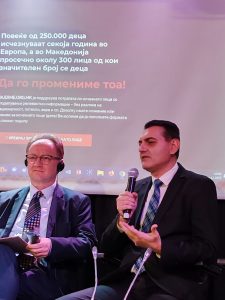
-За најава на системот ‘Најди ме’ секако ќе ви треба дозвола и од семејството. Исто така, бараме дозвола од семејството на веб-страницата на нашите исчезнати лица. Доколку немаме, не објавуваме фотографија и информации за исчезнатото лице. Кога ќе се пријави исчезнато лице, кажете сè што знаете. Може многу да помогне и најбезначајната информација што ви се чини“, рече Ангеловски.
Тој ја нагласи соработката со ЈЧП како добар пример за соработка на институциите и невладините организации за доброто на граѓаните, а бидејќи децата се многу ранлива група, тоа е особено важно.
Сашко Сирачевски, главен инспектор во националната единица за борба против криумчарење мигранти и трговија со луѓе, Оддел за криминалистички истраги, Оддел за сузбивање организиран и тежок криминал, МВР, ја презентираше Националната единица која ја води Јавен обвинител при Основниот Јавното обвинителство за гонење организиран криминал и корупција (ОЈО за POCC), раководител и заменик началник на НУСМШТ, како и 12 инспектори, аналитичар, лице за документирање и 21 лице за контакт во граничната полиција и Бирото за јавна безбедност, како и По 2 лица во секој од 8-те сектори за внатрешни работи. Како што рече, соработката со невладините организации е во трговијата со луѓе (дете или возрасен) и тие даваат поддршка во обезбедувањето на правата на лицето додека не се утврди како жртва на трговија со луѓе или потенцијална жртва на ТП. Соработката со регионалните центри и внатрешните сектори на МВР е висока со цел да се заштеди време и ресурси во размената и протокот на информации од локално до централно ниво.
Тој рече дека Северна Македонија е дефинирана како транзитна земја поради географската положба, постоењето на организирани криминални групи и има мешани бегалски и мигрантски групи во илегална миграција. Таа е земја на потекло поради економската и социјалната положба, невработеноста на младите, надежта за подобар живот во странство, ранливата категорија на лица, а децата често се жртви, но и земја на крајна дестинација (жртви на трговија со луѓе) во мал процент, за работа во барови, ресторани, ноќни клубови, сезонски работници, но и принудни бракови, модифициран начин на работа.
Тој ја спомена постапката за пријава на исчезнато лице во полиција, велејќи дека семејството и пријателите на исчезнатото лице се клучни во истражниот процес, како и споделување информации за семејните односи, претходното однесување, местата на предност, идните планови кои можат да ги водат претресот, а важно е да се даде фотографија и да не се крие информација од полицијата. Во случаите на лица со здравствени проблеми како деменција, важно е да не ги оставите без поддршка и грижа од друго лице. Тој рече дека воспоставувањето на EWS за исчезнати деца е корисна алатка која со добра поддршка и соработка за сите засегнати страни може да помогне да се забрза процесот на пребарување и успешно враќање на исчезнатите деца.
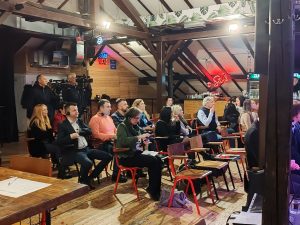 Баже Димитриовски, главен инспектор во Единицата за имотен и насилен криминал, Оддел за криминалистичка полиција, МВР, чие одделение е дел од мрежата полициски експерти формирана од Amber Alert Europe, во размена на искуство, координација со институции и невладини организации, рече дека обврските на одделението преземаат активности поврзани со исчезнување на лица, меѓу кои и деца. Единици на МВР кои работат на исчезнати лица се Секторот за меѓународна полициска соработка-потраги, Интерпол, Одделот за сузбивање на организиран и сериозен криминал, сите сектори за внатрешни работи во државата, Одделот за крим полиција со секторот за општа и насилен криминал. Во таа смисла, Одделот за криминалистичка полиција ги координира активностите заедно со соодветните Одделенија, Одделенија, сите Сектори за внатрешни работи на територијата на Република Северна Македонија за откривање, расветлување, докажување и спречување на овој вид криминал.
Баже Димитриовски, главен инспектор во Единицата за имотен и насилен криминал, Оддел за криминалистичка полиција, МВР, чие одделение е дел од мрежата полициски експерти формирана од Amber Alert Europe, во размена на искуство, координација со институции и невладини организации, рече дека обврските на одделението преземаат активности поврзани со исчезнување на лица, меѓу кои и деца. Единици на МВР кои работат на исчезнати лица се Секторот за меѓународна полициска соработка-потраги, Интерпол, Одделот за сузбивање на организиран и сериозен криминал, сите сектори за внатрешни работи во државата, Одделот за крим полиција со секторот за општа и насилен криминал. Во таа смисла, Одделот за криминалистичка полиција ги координира активностите заедно со соодветните Одделенија, Одделенија, сите Сектори за внатрешни работи на територијата на Република Северна Македонија за откривање, расветлување, докажување и спречување на овој вид криминал.
Тој ја спомна важната работа во некои случаи на исчезнати деца што ја има канцеларијата на Интерпол во МВР што ја вршат присутните колеги Бојан Петровски и Бранислава Стојчевска.
Како што појасни, соработката меѓу институциите, со јавноста и невладините организации кои работат со деца, како и меѓуинституционалната соработка надвор од државата е многу важна бидејќи секој случај е различен и бара различен пристап. Осврнувајќи се на начините на исчезнување на децата, тој изјави: со извршување на кривично дело или со само-напуштање и напуштање дома. Мотиви за исчезнување на деца поради кривично дело се: противправно лишување и грабнување како основ за изнуда на пари, насилно грабнување дете и посвојување дете од еден од родителите поради проблеми во бракот – развод и распоредување на детето, трговија со луѓе. и други режими. Самоиницијативно заминување и напуштање може да се случи поради незадоволство од семејниот живот на сопружниците, нарушени односи меѓу родителите и децата, забранета љубов, здравствени проблеми.
Како што рече Димитриовски, постапката за поднесување пријава за исчезнато лице е неопходна, но и казнива како кривично дело доколку е лажна. Кога се врши потрага по исчезнато лице на локално ниво во една од единиците или во Скопје, се споделува и на централно ниво, а за временските ограничувања од 24 часа најчесто се разговара со обвинителот, за да не се губи време. . Доколку случајот е чувствителен, обвинителот дозволува да се лоцираат мобилни телефони и да се организира претрес. Добрите тимови, опремени, но и локалното познавање на теренот и поддршката понекогаш се клучни за успешно пронаоѓање на исчезнато лице, така што воспоставувањето на EWS од JHR како механизам за поддршка е добро и може дополнително да се зајакне со соработка на различни засегнати страни кои дајте услуги кои можат да помогнат во ширењето на веста и забрзување на потрагата по исчезнато лице.
Подоцна се приклучи и претставничката од Министерството за образование и наука Јаворка Ѓоргиевска и накратко ги образложи активностите што министерството ги спроведува што станува збор за ранливите групи како што се децата Роми да ги интегрираат во образовните процеси. Како што напомена, бројот на образовни медијатори се зголемува и за учебната 2023/24 година беше повик за 40 ромски образовни медијатори, а се работи на минимизирање на напуштањето на училиштето, но и стимулирање на понатамошното образование, по основното образование.
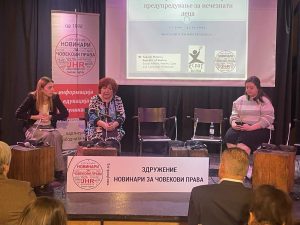 Наташа Доковска од Новинари за човекови права даде осврт на размената на информации преку студиските посети велејќи дека тоа е непроценливо искуство и можност да се добие увид во работата на австриските институции, невладини организации и медиуми на тема исчезнати деца и заштита на децата. правата воопшто, но и да видиме како меѓуинституционалната соработка може да ги подобри услугите за децата во нашата земја. Таа посебно го спомена како корисно вмрежувањето и размената на искуства на тема ТЛ и исчезнати деца меѓу новинарите од двете земји што е процес што треба да продолжи, со цел да се едуцира јавноста на темата безбедност на децата, како и едукација на новинарите. и вршење притисок во медиумите да третираат повеќе социјални теми.
Наташа Доковска од Новинари за човекови права даде осврт на размената на информации преку студиските посети велејќи дека тоа е непроценливо искуство и можност да се добие увид во работата на австриските институции, невладини организации и медиуми на тема исчезнати деца и заштита на децата. правата воопшто, но и да видиме како меѓуинституционалната соработка може да ги подобри услугите за децата во нашата земја. Таа посебно го спомена како корисно вмрежувањето и размената на искуства на тема ТЛ и исчезнати деца меѓу новинарите од двете земји што е процес што треба да продолжи, со цел да се едуцира јавноста на темата безбедност на децата, како и едукација на новинарите. и вршење притисок во медиумите да третираат повеќе социјални теми.
Ранливите групи како децата Роми се особено важни да бидат едуцирани, но и поддржани од сите институции со цел да се ограничи ризикот од случаи на исчезнати деца особено кај таканаречените фантомски лица – лица без извод од матична книга на родени. Таа рече дека проектните активности и процесот на воспоставување на веб-страницата EWS и вмрежување на различни засегнати страни е добар чекор кон системско подобрување на безбедноста на децата и минимизирање на ризиците од исчезнување на децата, но JHR ќе продолжи да работи на ангажирање на уште повеќе засегнати страни и бизниси и медиумите, на национално и на регионално ниво дури и по завршувањето на проектот.
Андреа Накова од JHR ги презентираше активностите на терен кои беа дел од втората фаза на проектот, конкретно 10-те студии на случај со семејства во социо-економски неповолни околности. Како што рече, тоа беше емотивен процес кој покажа образовни бариери, сложеност на документацијата, економска нестабилност и правни пречки, каде што се појавува убедлив акцент на критичната улога на образованието и како жртва и како светилник на надежта.
Овие приказни за 10 семејства ги прикажуваат далекусежните последици од ограничениот пристап до образование, без разлика дали произлегуваат од дискриминација, проблеми со документацијата, далечни животни околности или нарушени миграциски искуства. Образованието, често компромитирано, останува камен-темелник за прекинување на циклусот на неповолност, но сепак многу семејства се борат со пречките кои ги овековечуваат ограничените можности. Комплексноста на документацијата ги комплицира овие предизвици, значително го попречува пристапот до основните услуги, вработувањето и образованието за семејствата со миграциски искуства или несоодветен правен статус. Бирократската борба станува бариера за обезбедување основни права и витално образование за нивните деца.
Како што објасни таа, економските тешкотии ги влошуваат овие сложености, оставајќи ги семејствата со недоволни ресурси за да ги задоволат основните потреби или да инвестираат во образованието на нивните деца. И покрај овие огромни предизвици, издржливоста и непоколебливата решителност на овие семејства блескаат, нагласувајќи ја нивната длабока посветеност на образованието како пат кон посветла иднина.
Овие наративи служат како потресен потсетник за итната потреба од системски реформи и сеопфатни структури за поддршка. Рационализацијата на процесите на документација, подобрувањето на пристапот до образованието во маргинализираните заедници и справувањето со економските разлики се појавуваат како критични чекори. Колаборативните напори кои вклучуваат владини тела, образовни институции, невладини организации и субјекти за правна помош се императив за да се отстранат овие бариери и да се поттикне средина која се залага за инклузија, го поттикнува образованието и ги овластува семејствата да напредуваат и покрај неволјите. Овој колективен напор е суштински во трансформирањето на борбите во приказни за успех и издржливост, каде надежта преовладува дури и во услови на најпредизвикувачки околности, заклучи Андреа Накова, елаборирајќи ја теренската работа за време на проектот.
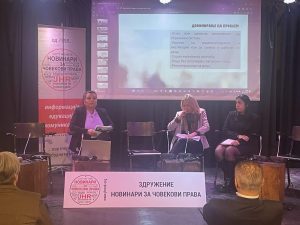
Данијела Цицвариќ од Романо Центро, Австрија, која работеше на препораките за институциите, зборуваше за работата што ја вршат во Австрија и за препораките што беа дадени во однос на локалниот контекст.
Од своето искуство во работата со деца Роми, здружението Романо Центро со години знае дека повеќето деца Роми имаат огромни проблеми на училиште (на пример, отсуство од работа, нејасен статус на престој на нивните родители, здравствени нарушувања, финансиски тешкотии, непознавање на австрискиот образовен систем , недоволно образование на родителите) и дека образовната ситуација на Ромите со миграциско потекло е генерално многу лоша. Покрај тоа, постојат пречки поради недостаток на јазични вештини и/или несигурност на родителите.
Посредувањето во училиштата на Ромите успешно се спроведува во многу европски земји (на пример, Финска, Франција, Шпанија, Чешка) и се наведува како успешен модел во тековниот процес на развивање стратегии за интеграција на Ромите во многу земји. Тоа е особено нагласено од Комисијата на ЕУ во нејзината проценка на националните мерки или се наведува како пример за најдобра практика (Европска комисија, C (2013) 778 финале).
Стратегијата за Ромите на Австриската Федерална влада од 2017 година предвидува користење на ромски училишни посредници од една страна во образовниот сектор, за подобрување на образовната состојба и од друга страна во областа на пазарот на трудот, за образовно и кариерно советување на интерфејсот помеѓу училиштето и работата. Во проширената Национална стратегија за интеграција на Ромите, која беше објавена во 2021 година, посредувањето во училиштата на Ромите е исто така нагласено како мерка во двете споменати области (Федерална канцеларија, Стратегија за Ромите 2021 година).
Општата цел на Зголемување на образовните можности на децата Роми и повратните информации за работата на ромските училишни медијатори од училиштата е многу добра. Наставниците, директорите и социјалните работници во училиштата ги гледаат ромските училишни медијатори како важен дополнителен ресурс за нивното училиште, што овозможува подобро справување со проблемите на семејствата и што доведува до намалување на меѓусебните предрасуди и стравови, објасни таа. Во многу случаи, ромските училишни медијатори можат да придонесат и за подобрување на социјалната состојба на семејствата и повеќе да ги мотивираат децата да одат на училиште. Фактот дека „да се биде Ром“ станува проблем во училиштата во кои работат ромски училишни медијатори нема негативни ефекти, како што покажуваат сите повратни информации на оваа тема. Дополнително, директорите нагласуваат дека и покрај многуте постоечки служби за поддршка во училиштата, како што се: училишните социјални работници, училишните психолози, наставниците по мајчин јазик, ромските училишни медијатори постигнуваат најдобар успех кај родителите Роми.
Зборувајќи за препораките, Данијела Цицвариќ од Романо Центро истакна:
-Редовно распоредување на ромски училишни медијатори во основните и средните училишта
-Да се регрутираат ромски училишни медијатори од заедницата
-Ромските училишни медијатори или имаат обука за психосоцијална професија (на пример, социјални работници) или посетуваат дополнителна обука во психосоцијалното поле (доколку немаат завршено обука, тесна соработка со училишните социјални работници, училишните психолози)
-Редовен надзор на ромските училишни медијатори
-Одржливост и обезбедено финансирање
-Индивидуална бесплатна помош за учење, која е достапна за семејства или деца дома
-Сензибилизација на училишниот персонал (на пр. наставници, директори) во образовните институции
-Сензибилизација на социјални работници (детска и младинска заштита и социјални работници од други релевантни институции)
-Подигнување на свеста кај полициските и судските службеници
-Подигнување на свеста кај новинарите
-Подигнување на свеста кај медицинскиот персонал (лекари, медицински сестри, итн.)
-Сензибилизација на државните службеници
Во споредба со другите европски и земји кои не се членки на ЕУ, австрискиот социјален систем е многу добро структуриран. Социјалните бенефиции (парични и безпарични надоместоци) се обезбедуваат од различни органи и институции. Различни законски барања се применуваат и за добивањето на различни бенефиции (на пр. австриско државјанство или лица третирани како австриски државјани, одредени дозволи за престој). Најважните финансиски услуги во Австрија се:
-Семеен додаток (кој го добиваат семејствата без оглед на нивниот приход)
-Минимален приход (за лица без приход или приход под прагот)
-Надоместок за невработеност (за невработени лица)
-Додаток за домување
-Детски додаток
Покрај тоа, во Австрија има многу советувалишта, вклучително и некои ромски здруженија, кои ги поддржуваат семејствата во нивните социјални и економски проблеми и, пред сè, им помагаат да ја подобрат својата економска состојба.
Како што објасни таа, препораките во оваа смисла се:
-Во случај на невработеност или приход под лимитот, се јавува законско право на социјална помош
-Семеен додаток до 18. Возраст (до 24 години во случај на образование), без оглед на приходите на родителите или старателите
-Додаток за детска грижа (без разлика дали родителите или старателите работеле пред раѓањето на детето или не)
-Обезбедени услови за домување или финансиска поддршка за домување
-Надоместок за невработеност (најмалку 6 до 12 месеци) во случај на отказ
-Проекти за пазарот на труд конкретно насочени кон Ромите и нивните потреби
-Проекти на пазарот на труд со мерки за квалификација. За времетраењето на мерките за квалификација, заводот за вработување го презема покривањето на трошоците за живот / финансиска сигурност за време на мерката
-Ромите се вработени како кадар во сите релевантни институции
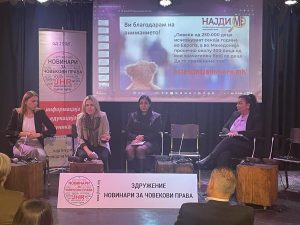
Јелена Јовановиќ, училишен посредник, Романо Центро, Австрија рече дека од септември 2000 година, Романо Центро вработува ромски училишни посредници (порано училишни асистенти) во избрани виенски училишта, кои обезбедуваат важна поддршка за многу деца Роми, родители и наставници. Тие посредуваат помеѓу горенаведените актери, ги мотивираат и ги придружуваат децата во училницата и ги поддржуваат во нивното учење, им помагаат на наставниците да ја разберат културната позадина и животната ситуација на децата и родителите да најдат позитивен пристап кон училиштето со цел да можат да ги издржуваат своите деца. Поради нивното познавање на нивниот мајчин јазик (ромски, српски, романски) и сопствената припадност кон ромската етничка група, училишните посредници имаат функција за идентификација на децата и им се достапни на родителите како доверливи лица – со разбирање на социјалното , културна и секојдневна позадина. Како што рече, бидејќи има само 2 посредници, таа и уште еден колега, тоа е предизвикувачки процес, но тие се трудат да го направат тоа што е можно поуспешно и да одат во секое училиште во кое се повикани.
Нивната задача се:
-Поддршка на односите училиште-дом и комуникацијата помеѓу наставниците и родителите Роми
-Информации, совети и поддршка за родителите во училишните и образовните прашања
-Лице за контакт (на повеќе јазици) за ученици и родители Роми и за наставници во случај на грижи или проблеми на/со ученици Роми
-Придружба на наставните резултати за да се обезбеди учество на учениците Роми
-Поддршка на учениците Роми во училницата за време на часовите, особено преку комуникација на нивниот мајчин јазик
-Обезбедување дополнителни можности за учење или можности за поддршка на децата Роми
-Давање знаење на учениците и наставниците за ромската култура и историја со цел да се промовира меѓусебното разбирање и самодовербата меѓу учениците Роми
-Обезбедување услуги за поддршка на семејствата за подобрување на социјалната состојба и ориентација во општествениот пејсаж на Виена
советување на децата, младите и возрасните за темите за образование и избор на кариера, како и за прашања за образование и обука; -Придружба на младите до понуди за почетна и стручна обука како и мотиви за проактивно пребарување за нив
-Учество во избрани младински проекти за зајакнување на самопочитта
Од нејзиното искуство, директорите исто така веруваат дека многу ученици Роми кои нередовно доаѓаат на училиште се со поголема веројатност да бидат присутни во деновите кога на локацијата се и ромски училишни посредници. Родителите ги гледаат ромските училишни посредници како доверливи лица кои ги застапуваат нивните интереси и интересите на нивните деца.
Фикрија Таир, експертот од Северна Македонија кој ги презентираше препораките најпрвин зборуваше за правниот контекст и проблемот, по што продолжи со елементите на Рамковниот модел за исчезнати лица:
-Јасна дефиниција за тоа што претставува исчезнато дете;
-Воспоставување лесен механизам за пријавување на исчезнато дете;
-Итна истрага по пријава за случај на исчезнато дете;
-Строга контрола при прекугранично патување со дете;
-Воспоставен национален регистар на исчезнати лица;
-Воспоставување на добар механизам за управување со регистарот и информациите;
-Воспоставување систем за дистрибуција на фотографија на исчезнато дете
-Начин на одговор и покренување истрага од страна на надлежните институции;
-Меѓуинституционална соработка и формални договори;
-Поттикнување на вклученоста на јавноста и граѓанскиот сектор;
-Воспоставување на Систем по примерот на Amber Alert.
Таа, исто така, се осврна на отсуството и исклучувањето од образовниот систем како еден од потенцијалните ризици од исчезнување и даде преглед на препораките за институционализација на СВС:
Донесување закони за клучни прашања со цел институционализирање и воспоставување функционален систем за рано предупредување за случаите;
Системот за рано предупредување и целата процедура околу неговото активирање треба да бидат брзи.;
Потребна е соработка помеѓу органот што ја води истрагата и полицијата при активирање на овој систем;
Системот за социјална заштита треба да биде вклучен во одлучувањето за активирање на системот за рано предупредување за случаи на исчезнати лица, земајќи ја предвид евиденцијата што ја водат Центрите за социјална работа;
Соработка со компании кои управуваат со социјалните мрежи;
Потребната бесплатна телефонска линија наменета за пријавување исчезнати деца;
Физибилити студија за институционализација;
Потребни се воспоставени политики, стандарди и оперативни процедури, подеднакво и на ист начин да се преземаат и следат за секој случај на исчезнато дете без исклучок;
Меѓуинституционална соработка со јасно дефинирани улоги;
Системот треба да содржи информации и соодветно да ги ажурира, за начините на пријавување случаи на исчезнување;
Да се обезбеди поддршка во процесот на превенција на жртвите со задолжително активирање на надлежните институции.
Таа заклучи со препораките за превенција и минимизирање на ризиците од исчезнати деца:
Вклучувањето на образовните институции, наставниот кадар и стручните служби во училиштата треба да се вклучи во системот за исчезнати деца;
Државниот просветен инспекторат да биде проактивен, односно да реагира и спречува кога се дава информација за отсуство;
Институционална соработка во размената на информации за децата кои отсуствуваат од образовниот систем;
Државата треба да обезбеди расчленети податоци по различна основа;
Поефективен механизам за евидентирање на децата на улица, соодветно реагирање и по потреба вклучување на други надлежни институции;
Да се искористат и надградат капацитетите на новинарите кои известуваат за темата;
Во надминувањето на проблемот треба да се вклучат образовни медијатори, лични асистенти и социјални работници и психолози;
Институциите за деца без родители или мали групни домови да развијат подобар систем за лоцирање и проверка на децата кога тие излегуваат надвор од објектите;
Отворање нови центри за деца на улица со сеопфатни програми за интегрирање на семејствата во општествените текови;
Јасно да се дефинираат надлежностите на социјалните центри и полицијата при интервенциите;
Потребно е директно вклучување во процесот превенција и психосоцијална поддршка, сензибилизација и обука;
Да се подобрат услугите за децата и да се воведе посебна институционална единица.
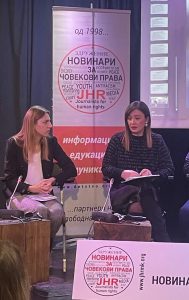 На завршната сесија на конференцијата, Александра Радевска беше истакнато дека исчезнувањето, ризиците од исчезнување на децата како тренд во современото општество, насилството, без разлика дали е онлајн насилство, физичко насилство, психичко малтретирање, се предизвици кои нашироко ги засегаат сите, но претежно децата како најранлива категорија. Таа нагласи дека се планира алармот, односно широкото информирање на јавноста за исчезнати лица, да се покрене само во случај на киднапирање, односно висок ризик по животот на исчезнатото лице и поддршка во ширењето на информациите може да дојде од различни места. Затоа бизнисите се важни партнери во овој процес, рече таа претставувајќи ги првите одговорни бизниси кои се приклучија на EWS за исчезнати деца.
На завршната сесија на конференцијата, Александра Радевска беше истакнато дека исчезнувањето, ризиците од исчезнување на децата како тренд во современото општество, насилството, без разлика дали е онлајн насилство, физичко насилство, психичко малтретирање, се предизвици кои нашироко ги засегаат сите, но претежно децата како најранлива категорија. Таа нагласи дека се планира алармот, односно широкото информирање на јавноста за исчезнати лица, да се покрене само во случај на киднапирање, односно висок ризик по животот на исчезнатото лице и поддршка во ширењето на информациите може да дојде од различни места. Затоа бизнисите се важни партнери во овој процес, рече таа претставувајќи ги првите одговорни бизниси кои се приклучија на EWS за исчезнати деца.
М-р Спасијка Ефтимоска, независниот координатор за односи со јавност во Комерцијална банка рече дека Комерцијална банка како високо општествено одговорна компанија ќе биде првата банка во земјава која ќе споделува информации за исчезнатите деца на своите банкомати со цел побрзо да ги пронајде. Банката ја има честа да биде партнер на платформата Najdime.org.mk, која започна да функционира во Северна Македонија како проект на Новинарите за човекови права. Како што рече, Комерцијална банка ја поздравува оваа благородна иницијатива и промоцијата на веб-страницата Najdime.org.mk. Оваа веб-страница има за цел да воведе Amber Alert систем за рано предупредување на исчезнати деца во нашата земја, а Комерцијална банка ќе придонесе за ефикасно функционирање на овој систем преку споделување информации преку својата мрежа на банкомати низ целата земја. На екранот на секој банкомат на Комерцијална банка, кога ќе се појави потреба, ќе се сподели слика од исчезнатото лице и телефонски број на кој ќе се пријави доколку некој го види исчезнатото дете, рече таа.
-Во денешно време има се повеќе механизми и канали кои овозможуваат информациите за исчезнатите деца брзо да се шират и да допрат до што повеќе луѓе. Но, за жал, има се повеќе ризици и различни предизвици кои можат да го одвлечат вниманието на децата и да ги изложат на сериозни опасности. Во вакви услови, грижата за заштита на децата и нивните основни права е голем предизвик. Комерцијална банка, во духот на своето корпоративно мото „Заедно е полесно“, смета дека во вакви проекти треба да се вклучат сите општествени чинители кои можат да придонесат. Подготвени сме да дадеме свој придонес за што помалку исчезнати деца и што поскоро да ги најдеме, додека искрено посакуваме никогаш да нема потреба од вклучување на Amber Alert во земјава, рече Спасијка Ефтимоска.
Сашо Рајчановски, претседател на Групацијата за автотакси превоз на Град Скопје, член на Советот за сообраќај на Град Скопје и сопственик на првата приватна такси компанија Коммак-комерц Скопје, ја поздрави иницијативата и промоцијата на веб-страницата Најдиме. org.mk и потврдија дека нивна општествена одговорност е да се приклучат во напорите за пронаоѓање исчезнати деца и да ги споделат информациите преку нивната мрежа кога има итна потреба.
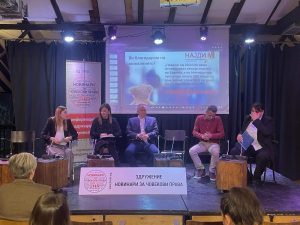 -Како и секогаш постојано се залагаме за поголема безбедност на граѓаните, дававме предлози и идеи за намалување на загадувањето и сообраќајниот метеж, минимум 1500 нови вработувања, зголемување на буџетот и слично. Сега преку медиумите даваме предлози за заштита, спречување и намалување на насилство, криминал, грабежи, киднапирања, непочитување на сообраќајните прописи…Факт е дека речиси сите учесници во разни кривични дела, кривични дела, кражби, разбојништва, грабнувачи, сообраќајни прекршители, исчезнати лица, трговија со луѓе, криумчарење мигранти итн. Се превезуваат со возила или како пешаци се директни учесници во сообраќајот и оттука земам за право да разговарам за ова – рече Рајчаноски.
-Како и секогаш постојано се залагаме за поголема безбедност на граѓаните, дававме предлози и идеи за намалување на загадувањето и сообраќајниот метеж, минимум 1500 нови вработувања, зголемување на буџетот и слично. Сега преку медиумите даваме предлози за заштита, спречување и намалување на насилство, криминал, грабежи, киднапирања, непочитување на сообраќајните прописи…Факт е дека речиси сите учесници во разни кривични дела, кривични дела, кражби, разбојништва, грабнувачи, сообраќајни прекршители, исчезнати лица, трговија со луѓе, криумчарење мигранти итн. Се превезуваат со возила или како пешаци се директни учесници во сообраќајот и оттука земам за право да разговарам за ова – рече Рајчаноски.
Во однос на заштитата и спречувањето на горенаведените дела, важно е да направиме нешто за да се заштитиме и да ги одвратиме и обесхрабриме сторителите од незаконски дејствија, бидејќи однапред ќе знаат дека многу брзо ќе бидат откриени и санкционирани. Неговите предлози се задолжително поставување камери на секоја зграда, училишта, градинки, установи итн… и задолжително во сите регистрирани возила на територијата на Република Северна Македонија што ќе снимаат надвор од возилото и снимките ќе бидат прифатени како дел. на докази. Бидејќи не е ништо ново, во некои земји функционира беспрекорно, камерите снимаат јавна површина (без повреда на приватноста) како и овие што сега ги имаме на раскрсници, булевари и слично. Овој начин на користење на камерите во возилата создава сериозен проблем за оние кои сакаат да направат незаконско дело, бидејќи се свесни дека многу брзо ќе бидат откриени. Ова е иднината, знаеме кому нема да му се допадне, но сите заедно треба да направиме голем притисок да прифатиме вакво нешто што е врв на превенцијата и безбедноста за сите граѓани, рече тој.
Сашо Негриевски, службеник за заштита на лични податоци, Јавното сообраќајно претпријатие ЈСП Скопје го поздрави формирањето на EWS за исчезнати деца и изрази целосна поддршка во неговото функционирање. Како што рече, ЈСП ќе ги сподели информациите за исчезнатите деца во автобусите на дигиталните дисплеи како и електронските платформи на автобуските постојки во Скопје, информирајќи ја јавноста и помагајќи да се рашири информацијата за што поскоро пронаоѓање на исчезнатото дете. Ова е добра иницијатива што треба да ја поддржат сите одговорни бизниси и други чинители во државата бидејќи обврска на сите нас е да ја гарантираме безбедноста на нашите деца, рече Негриевски.
Крсте Блажевски, претседател на ХОТАМ – Здружение на хотели, ресторани и кафулиња, исто така го поздрави формирањето на веб-страницата и ја потврди својата поддршка во ширењето на информациите за исчезнати деца преку мрежата на ХОТАМ, на овој начин помагајќи го пребарувањето и осигурувајќи се дека детето е безбедно и брзо пронајдено. Како што рече, ова е систем кој функционира добро во многу земји во светот и добро е што иницијативата на НВО е поддржана од институциите, а и бизнисите треба масовно да ја поддржат за системот да биде долготраен и добар. -функционирање.
На крајот организаторите им се заблагодарија на сите учесници во проектните активности во изминатите две и пол години, рекоа дека препораките ќе бидат споделени со институциите и со сите засегнати страни и ги повикаа сите институции, бизниси, експерти, да продолжат и да ги развиваат своите поддршка на системот за предупредување за да се намали ризикот од исчезнати деца и да се забрза процесот на нивно пронаоѓање и безбедно враќање.

